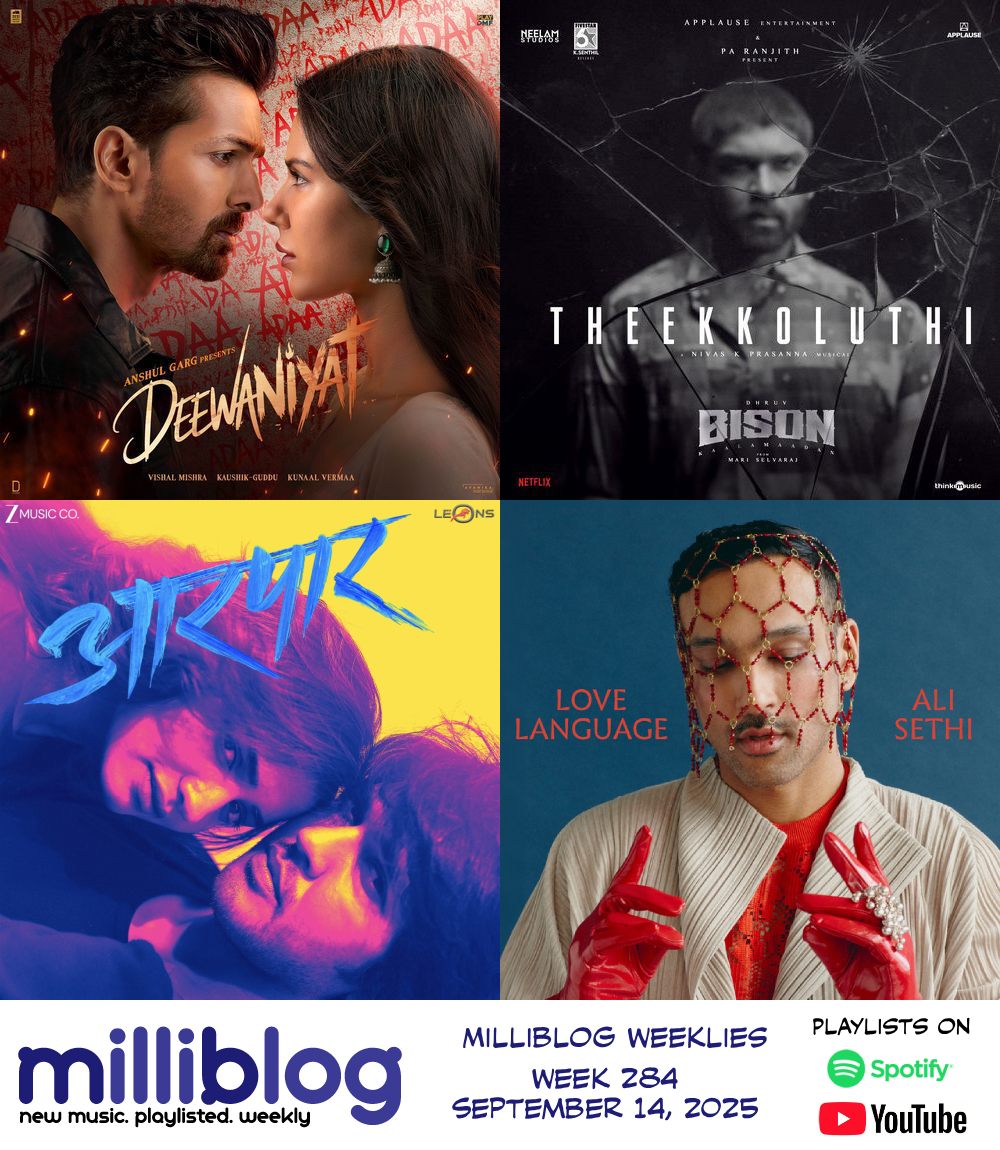Milliblog Weeklies – India’s only multilingual, weekly, new music playlist.
Week 284: YouTube | Spotify
A humongous playlist, for Milliblog Weeklies’ standards – 28 songs this week!
Title song – Ek Deewane ki Deewaniyat (Kaushik-Guddu) – Hindi: When the ‘Tu hi armaan’ line explodes, guitars blazing the backdrop, I was pleasantly taken aback because the opening of the song hardly prepared me for that 🙂 Kaushik-Giddu’s composition and music sound like the power version of a Mithoon song, considering the latter has almost seemed to have given up composing anything energetic and focusing more on musically anemic melodies. Excellent singing by Vishal Mishra too, as always.
Kuch Toh Hai – Tu Meri Poori Kahani (Anu Malik) – Hindi: Across the soundtrack of Tu Meri Poori Kahani, Anu Malik seems to be stuck in a time warp. The title song is an unabashed umpteenth reworking of ‘Where do I begin?’ from Love Story, that was alreayd expertly recreated as ‘Chaand Chupa Badal Mein’ by Ismail Darbar in Hum Dil De Chuke Sanam. My sole pick of the rather jaded soundtrack, Kuch Toh Hai, is a pick mainly for Aanandi Joshi’s singing, even as it sounds more like a classic Jatin-Lalit song from the yore than anything by Anu Malik. There’s a strong whiff of even Nadeem-Shravan Aashiqui chartbuster, Mera Dil Tere Liye.
Theekkoluthi – Bison Kaalamadan (Nivas K Prasanna) – Tamil: While I’m happy that Nivas is working with Mari Selvaraj, I do miss his collaboration with Santhosh Narayanan. To be fair to Nivas, he does terrific work here, composing and singing this searing number. The percussion is the real hero of the song, and it takes time to amp up, after only bubbling mildly in the beginning (and again in the second interlude where it completely vanishes to let the pathos fully register). It’s a gorgeous number and I can’t wait to hear more from Nivas’s work with Mari Selvaraj in this album.
Asalenduke – Krishna Leela (Bheems Ceciroleo) – Telugu: A lilting song from Bheems that knows the song’s highlight and uses that ‘Cheppa Pettakunda Gundelloki’ hook in musical form too, as if to underline it as the best part. Yazin Nizar can hardly go wrong with a simple, likeable melody like this.
Kalale Kalale – K-RAMP (Chaitan Bharadwaj) – Telugu: Chaitan builds his melody beautifully in the lead up to the addictive ‘Nanne Ardhamlo’ hook that lands brilliantly. Much of the song’s credit should also go to Kapil Kapilan.
Puppy Shame – Andhra King Taluka (Vivek-Mervin) – Telugu: After Nuvvunte Chaley, the composing duo from Tamil almost get another right too. Almost because the hook is truly fanatstic. It’s just the overall song doesn’t flow as soomthly around it as much as I expected it to.
Hammayya, Please Please Ma’am – Sundarakanda (Leon James) – Telugu: Hammayya, probably becuse its singer Ram Miriyala (who also composes rather well himself), it sounds more like his own song than something usually expected from Leon. It’s a nice, catchy, and simple song. It is in Please Please Ma’am that Leon truly shows his skills, impressively handling the strings and locating Jonas Hocherman’s Trombone to excellent effect in the melody. There are a lot of singers here and they (Arjun Chandy, Deepak Blue, Aravind Srinivas, Saisharan, Reshma Shyam, Haripriya, Lavita Lobo), together, does a stupendous job elevating the title hook.
Kallimull, Nee Mayathe – Maine Pyar Kiya (Electronic Kili) – Malayalam: Despite the scathing reviews for the movie, Electronic Kili’s music for the movie is a great listen! After Manohari and Welcome to Mollywood, I really liked two more songs from the full soundtrack. With its constant flute refrain in the background, Kallimull’s languid melody really shines with a range of sounds from punchy percussion to a more melodic backdrop. Both Zia Ul Haq and Vijay Anand do a great job together. In Nee Mayathe, Sanjith Hegde completely holds the song on his vocal prowess even as Haritha Raj’s Veena does stand out adding flavor to the energetic background sound.
Kaadhal Ponmaan – Night Riders (Yakzan Gary Pereira & Neha S Nair) – Malayalam: There’s a distinct Latino twang in the sound and the tune, but with the nadaswaram and thavil too jostling for space, the composers situate the song beautifully within the Kerala mileu. Beyond all the sound, it is the lovely melody a the core, handled by Neha herself, along with Vishnu Vijay, that truly sells the song.
Preethi Mundhe – Elumale (D.Imman) – Kannada: It almost feels like the song starts from the middle, pushing us into a intensely melodic line from the anupallavi as the start of the song. The melody is typical of Imman, with captivating strings amplifying the feel in the background. Jitin Raj is an excellent choice for this kind of melody.
Hoshil Na, 36 Guun, and Mannmohana – Aarpar (Gulraj Singh) – Marathi: Aanandi Joshi is all over this week, if you consider her work in Tu Meri Poori Kahani, above. She is superb here, handling the ups and downs of Gulraj’s fascinating melody. Gulraj’s music seems like a distinct ode to the music of Rahman of a different vintage, closer to his debut. Listen to the violins in the background mid-way through the song! 36 Gunn, on the other hand, is trademark Gulraj Singh! While Avadhoot Gupte’s singing is expectedly lovely, it’s the totally unpredictable tune that is incredibly interesting while also being energetic. Mannmohana is the soundtrack’s best! Ankita Joshi is spellbinding with her rendition, but it is Gulraj’s incredibly enveloping and haunting melody that pierces through the vocals! Considering the melody reminded me of Rahman’s Edhu Sugam from Vandicholai Chinrasu and its predecessor, Ilayaraja’s Yem Debba Teesavuraa from Ashwamedham, I wonder if the raaga employed is Dharmavathi. Beautiful song, but!
Rutuchakra – Dashavatar (AV Prafullachandra) – Marathi: AV Prafullachandra’s musical style seems very similar to Gulraj Singh’s, to me – if I listen to a song by one, I usually assume it is by the other 🙂 Both have this unique way of building their songs gradually and confidently. For instance, wait for the exploding soundscape in the first interlude of Rutuchakra – it would completely take you by surprise!! The way the composer uses the two singers, Sahil Kulkarni and Swanandi Sardesai, is particularly brilliant, with the voices interlaced to great effect in the middle of the song.
Woh – Khatth ft. Sthitipadma Dash (Hindi/Indipop): A breezy melody that processes both lead vocals a bit too much for my comfort. But the tune, and the synth-laden sound, keeps the song consistently engaging. The sound is rather similar to what I expect from a standard-issue AP Dhillon number.
Sakhiye – Amrit Ramnath ft. Sithara Krishnakumar (Malayalam/Indipop): It’s good to see Amrit not focusing only on films and continue to produce pop singles too. Sakhiye is a warm, instantly likeable song with an interesting Hindustani/ghazal like inner core. Sithara Krishnakumar makes her presence felt in the middle of the song in impeccable style and the way Amrit layers their vocals one over the other at different points in the melody is fascinating.
Sundari – Sanju Rathod (Marathi pop): The Marathi Sai Abhyankkar scores yet again. Rather simple tune, but it is insanely catchy too!
Without Me – AP Dhillon (Punjabi pop): AP Dhillon’s new single leans heavily into Dhillon’s signature space between moody R&B-tinged trap and Punjabi pop swagger. Makes for an easy listen and is perfectly what I’d expect from him.
Long Distance Love – Shuvendu Das Shuvo (Coke Studio Bangla, Season 3) – Pop: Shuvendu’s soulful melody is intentionally cranked up inside a retro-style sound. The mix works really smoothly, with the tune enveloping us completely. The lead singers do a terrific job, Afrin, in particular, who joins mid-way. The blending of the lead singers’ vocals towards the end of the song is a great touch too.
Hanera, Hymn 4 Him, Villain, Jadugarni, Kaava, Tera Sitam, and Maya – Love Language (Ali Sethi) – Pop: Ali Sethi’s first full-length album (if you consider 2023’s Intiha as a shorter, debut album) makes for a remarkable listen. The soundscape is incredibly vibrant and lush, with a plethora of genres and experiments that go far beyond his most famous song, Pasoori. Hanera sounds like an eclectic mix of a standard-issue Hindi film song and bossa nova, with the ‘Ree te taar’ refrain punctuating the pleasing tune at the most opportune moments. The tabla-meets-reggaeton Hymn 4 Him has Ali Sethi flexing his vocals brilliantly, with a falsetto too mixed to great effect. Jadugarni too contains the typical reggaeton melody, and in a slower, more calculated package, is even more interesting. Kaava is straight out of the familiar Coke Studio sound mix with a pulsating rhythm and stellar singing by Ali Sethi particularly as the song is ending. Tera Sitam and Maya are both on the mellower side but hold beautifully dense melodies. In Maya, the sounds Ali Sethi concocts includes what sounds like ghatam (or an equivalent?) and a sliver of flute. Overall, if you liked Pasoori, you would thoroughly enjoy the entirety of this album.




